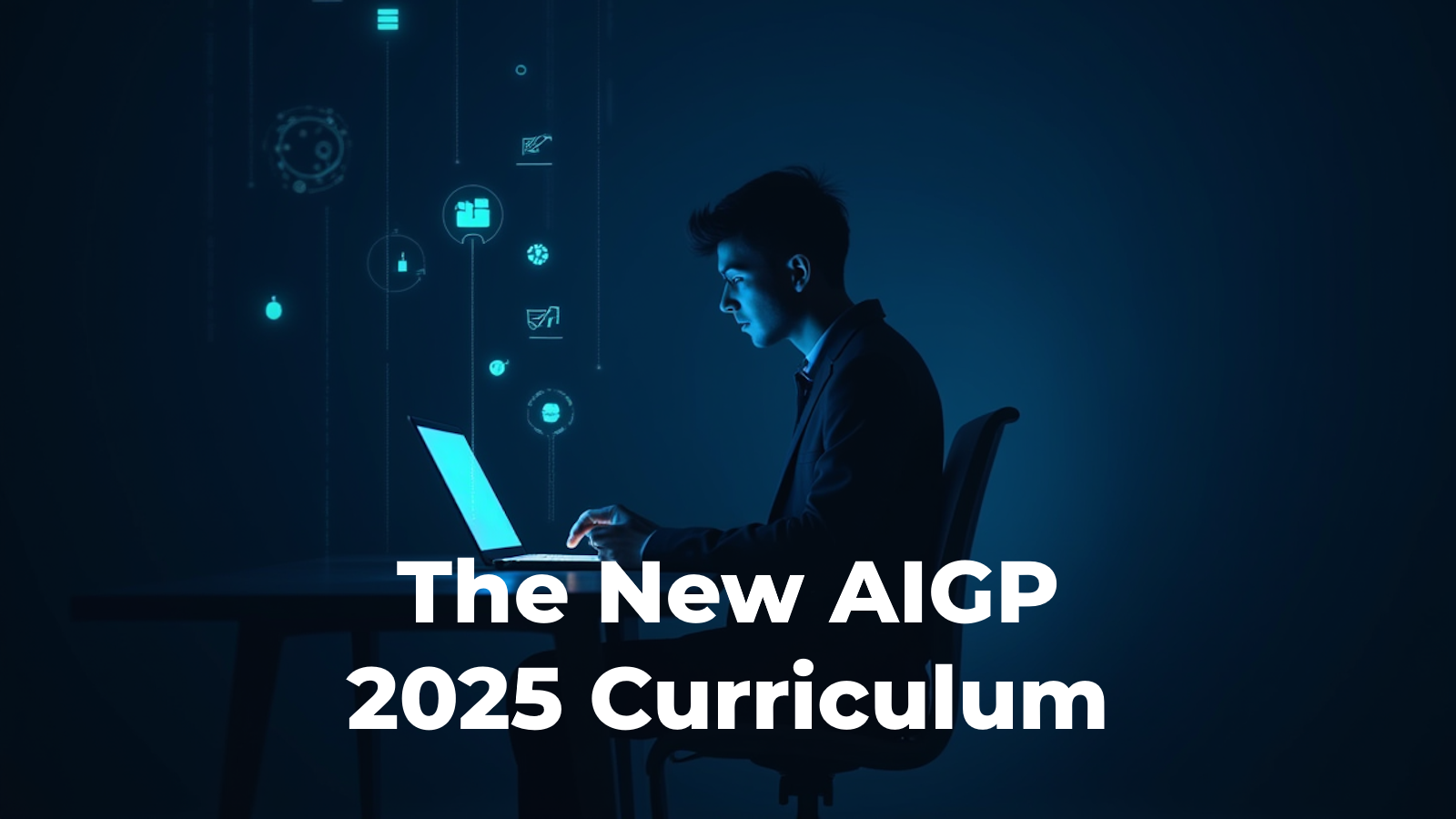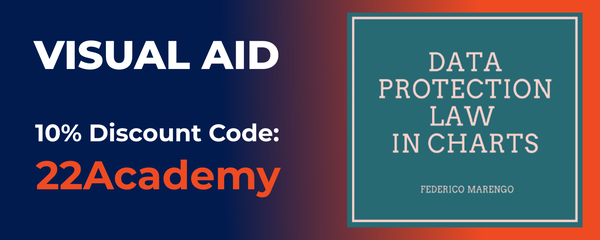The New AIGP 2025 Curriculum
The Artificial Intelligence Governance Professional (AIGP) curriculum has undergone a significant transformation, with a new exam structure taking effect on February 3, 2025. The changes go beyond minor updates—this is a fully restructured Body of Knowledge (BoK) that reflects the evolving field of AI governance. With the revised domains and redefined content, professionals preparing for certification now need to approach their studies with an updated framework and learning strategy.
Why a Full Rewrite Was Necessary
When I first learned about the upcoming changes, I expected to update the existing materials, adjusting content where necessary and replacing a few outdated exam questions. However, as I reviewed the new BoK, it became clear that a simple revision wouldn’t be enough—the changes were too extensive. Instead of adapting old content, I had to completely rebuild the courseware from the ground up, ensuring every module, lesson, and assessment aligned with the new curriculum. This process took three months, but the result is a structured and comprehensive learning experience tailored to the new AIGP exam.
The Changes in the AIGP Curriculum
The revised AIGP curriculum introduces a more structured approach, reducing redundancies and refining key concepts to better align with the role of AI governance professionals. By focusing on governance principles rather than technical details, the updated framework ensures that candidates develop a clear understanding of regulatory, ethical, and risk management responsibilities.
Key Structural Changes
One of the most significant updates is the reduction from seven domains to four, consolidating related topics to improve clarity. This restructuring eliminates repetitive content and provides a more logical learning path. A major improvement is the distinction between AI development and AI deployment, which were previously interwoven across multiple domains. Separating these areas allows governance professionals to better understand their responsibilities at each stage of the AI lifecycle.
What Was Removed and Why
To streamline the curriculum, certain topics were revised or removed:
- Less emphasis on technical content. While AI fundamentals remain, the curriculum no longer requires deep knowledge of machine learning models or their architecture. This reflects the fact that governance professionals are responsible for oversight, not model development.
- Removal of emerging AI laws and standards. The previous curriculum included evolving legislative developments, but the new version focuses on well-established frameworks that have broad industry adoption.
- Elimination of Domain VII. Ethical concerns and AI risks are now integrated throughout the curriculum rather than treated as a standalone section.
Why These Changes Make Sense
By focusing on governance principles rather than technical complexities, the new curriculum better reflects the responsibilities of AI governance professionals. The refined structure provides a clearer study path, helping candidates develop the knowledge and skills needed to assess compliance, implement governance policies, and manage AI risks effectively. The next step in preparing for the exam is understanding how these curriculum updates impacted the study materials and training resources.
The Challenge of Rebuilding the Courseware
Transitioning to the new AIGP curriculum was not just about updating content—it required carefully reevaluating which topics remained essential for AI governance professionals. While the revised Body of Knowledge provides a streamlined structure, some key governance concepts were removed, raising questions about what should still be included in the training materials.
Deciding What to Include or Leave Out
One of the biggest challenges was determining which topics to retain, even if they were no longer explicitly mentioned in the BoK. Some fundamental AI governance principles were removed, but in practice, professionals still need a basic understanding of technical foundations to effectively assess risks, oversee compliance, and collaborate with engineers.
Rather than following the BoK word for word, I made strategic decisions to keep certain key concepts in the course. The goal was to ensure that students are not only prepared for the exam but also equipped with the knowledge needed for real-world AI governance.
Balancing Accuracy with Completeness
While aligning the course with the new BoK was essential, it was equally important to provide a well-rounded education. Every lesson, case study, and quiz had to be carefully reviewed to strike the right balance between exam relevance and practical application.
To keep the content as effective as possible, feedback from students will be invaluable. If certain topics need more depth or should be adjusted, future updates will reflect real-world needs and exam performance trends.
Unexpected Challenges in the Process
Initially, I expected the transition to be a straightforward content update. However, as I worked through the BoK, it became clear that the changes were too extensive for a simple revision. The course had to be entirely rebuilt, a process that took three months.
Another unexpected discovery was how the exam question distribution is calculated. The BoK provides a range of expected questions per domain, but when adding up the maximum values, the total reached 98 instead of 100. After contacting IAPP, I learned that only 85 of the 100 exam questions are scored—the remaining 15 are unscored trial questions. This detail was critical in ensuring that my trial exam mirrored the real test as accurately as possible.
Rebuilding the course required significant effort, but the final result is a structured, comprehensive study experience that fully aligns with the new AIGP exam.
Developing the New Course and Study Materials
Rebuilding the AIGP study materials meant more than just updating content. The new curriculum required a complete restructuring of study resources to ensure candidates could prepare effectively under the new framework. The materials now offer multiple options, allowing candidates to choose the best fit for their study approach.
AIGP Exam Prep Suite
The AIGP Exam Prep Suite is the most comprehensive option, covering everything needed for a structured and effective study experience. It includes:
- A structured study guide that helps candidates create a study plan, understand exam expectations, and develop strategies for multiple-choice and scenario-based questions.
- A 60-question assessment to identify which of the four domains require the most attention, helping candidates focus their preparation.
- 61 lessons across 13 modules. Each bite-sized lesson can be completed in less than half an hour, making it easier to fit studying into a busy schedule. Lessons include articles, case studies, structured learning objectives, videos and an audio version for flexible study.
- Digital flashcards, quizzes, and module recaps to reinforce learning at key points.
- A realistic trial exam to test knowledge under exam conditions.
Ultimate Prep Kit and Self-Study Kit
For those who prefer to study independently or already have study materials, the Ultimate Prep Kit and Self-Study Kitprovide structured guidance without the full eLearning course. Both include:
- The study guide and 60-question assessment to help structure preparation.
- A final trial exam to assess readiness before taking the real certification exam.
The key difference is that the Ultimate Prep Kit also includes four practice tests (50 questions each) to reinforce knowledge before taking the trial exam.
Practice Tests (4-Tests Package)
The four practice tests are also available separately. These tests help reinforce learning throughout the study process.
- Each test consists of 50 questions covering all four domains.
- The difficulty level is relatively easy compared to the trial exam, as they are designed to help strengthen knowledge rather than simulate the real exam.
- Each test comes with an answer key and explanations to review correct and incorrect answers.
Trial Exam
The AIGP trial exam is the closest simulation of the real AIGP certification test and is included in all main study packages but can also be purchased separately.
- It consists of 100 multiple-choice questions, structured according to the new four-domain format.
- Unlike the real exam, where 15 questions are unscored, every question in the trial exam is scored.
- Instead of an answer key, candidates receive a detailed performance breakdown, showing which topics need further review.
The trial exam is designed to be taken after completing all study materials, ideally one to two weeks before the certification exam. It helps candidates fine-tune their knowledge and focus on weak areas in the final days before the test.
What I Learned from This Process
Rebuilding the AIGP courseware was not just about aligning with the new curriculum—it also provided an opportunity to improve the overall learning experience. The process highlighted key insights, particularly in structuring the course and ensuring the right balance between theoretical knowledge and practical governance skills.
Structuring Was Easier, But Choosing Content Was More Challenging
The new Body of Knowledge follows a more logical sequence, making it easier to structure the course compared to the previous version, where overlapping topics caused redundancy. The four-domain format provides a clearer distinction between different aspects of AI governance, making the learning process more intuitive.
A major challenge was deciding what content to keep. Some topics removed from the BoK remain essential for governance professionals, particularly when collaborating with engineers and assessing AI risks. To ensure students are fully prepared for real-world responsibilities, I made strategic decisions to retain certain governance-related concepts, even if they were no longer explicitly listed in the Body of Knowledge. Feedback from students will help determine if any areas need further refinement in future updates.
Unexpected Challenges in the Process
Initially, I expected a straightforward update—adjusting articles and replacing outdated exam questions. However, it quickly became clear that a full rebuild was necessary. The structure, content, and exam preparation materials all had to be redesigned, a process that took three months.
Another unexpected challenge was understanding the IAPP’s approach to question distribution. The BoK outlines a range of expected questions per domain, but the total across all domains came to 98 instead of 100. After contacting IAPP, I learned that only 85 of the 100 exam questions are scored, with the remaining 15 serving as unscored trial questions. This detail was important in ensuring the trial exam accurately mirrored the real test.
Future Updates and Continuous Improvement
Keeping course materials up to date is essential as AI governance continues to evolve. While the study resources fully align with the new Body of Knowledge, ongoing refinements will ensure they remain relevant and effective.
Commitment to Keeping Courses Up to Date
While the current course materials are designed to reflect the latest requirements, future updates may be needed if new developments impact the certification. If another major curriculum change occurs, it may once again require a complete overhaul of study resources.
To maintain accuracy, all study materials are continuously reviewed. Smaller updates, such as refining explanations or adding relevant case studies, are made as needed. Any regulatory or industry changes that affect AI governance will be reflected in the course content as soon as possible.
The Role of Student Feedback
One of the most valuable ways to improve the course is through direct feedback from students. Since some governance-related topics were removed from the BoK but remain relevant in practice, student input will help determine whether certain topics should be expanded, refined, or adjusted.
Those using the new study materials are encouraged to share their experiences—whether certain subjects should be added or removed, whether the balance between theory and practice feels right, or if any areas could benefit from additional resources. This ensures that the course not only prepares candidates for the exam but also provides the practical knowledge needed for AI governance roles.
Advice for AIGP Candidates
Preparing for the AIGP certification under the new curriculum requires a structured approach. The revised exam focuses on governance rather than technical details, making it important to develop a strong understanding of AI governance principles and their application. With the updated study materials, candidates can effectively plan their study time and build the knowledge needed for both the exam and real-world AI governance responsibilities.
How to Approach Studying for the New Exam
If you are using the 22Academy study materials, you already have a well-structured program to guide your preparation. The study guide and assessment help identify which domains need the most focus, while the bite-sized lessons, quizzes, flashcards, and practice tests reinforce key concepts along the way. The trial exam serves as the best indicator of readiness, giving you a realistic preview of the actual certification test.
If you are preparing on your own, make sure to plan your study time carefully. Review all requirements in the Body of Knowledge, allocate time for each section, and ensure that you cover all key topics before the exam. Work through materials systematically, using reliable sources to strengthen your understanding. Test yourself with practice questions and simulate exam conditions to build confidence. And don't forget to join the AIGP Study Groups on Facebook and Linkedin. If you need structured support, we offer study packages for every budget, from self-study kits to full courses with all the resources you need to succeed.
Final Thoughts on the Curriculum Update
The new AIGP curriculum provides a more structured and logical framework for AI governance professionals. While the changes required a complete rebuild of the course materials, the result is a more effective and accessible study experience. Candidates who approach their preparation strategically—using the right materials and focusing on governance principles—will be well-positioned to succeed in both the exam and their professional roles.



